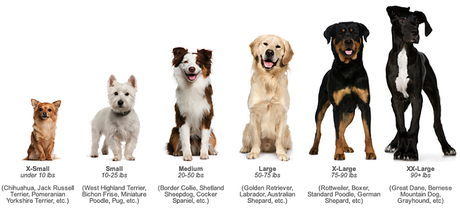
One of the most important determinants of a dog’s place in your lifestyle is size. If you live in a small apartment, you probably don’t want to share it with someone who occupies more space that you do. If you’re renting, whether it’s a house or an condo, landlords do consider the size of the dog who will be sharing the unit with you. Whether it’s fair or not, take these factors into consideration before you acquire a dog.
(Check out Bringing Your Pup Home)
While it’s not necessarily true that large dogs need more exercise than small ones do, it is certainly true that large breed coast more to feed and board. Furthermore, they require more effort when you go on poop patrol. Whether you are looking for a large or small dog, choose a breed that will meet your needs based on its ultimate adult weight – NOT what is looks like as a puppy, the size of its paws, or how cute the fuzzy baby is.
All puppies are cute. Make lifelong decisions based on what the breed is like as an adult and what you can honestly manage. Here’s some information to help you size up a prospective companion:
Weight Ranges for Some of the More Common Breeds

Size matters.
20 POUNDS
- Bichon Frise
- Cairn Terrier
- Chihuahua
- Dachshund
- Jack Russell Terrier
- Lhasa Apso
- Miniature Schnauzer
- Poodle
- Pug
- Shih Tzu
20 – 40 POUNDS
- Basenji
- Beagle
- Brittany
- Cocker Spaniel
- Dachshund
- Finnish Spitz
- Shetland Sheepdog
- Welsh Corgi
- Whippet
- Soft-coated Wheaten Terrier
40 – 80 POUNDS
- Basset Hound
- Boxer
- Chow Chow
- Collie
- Dalmatian
- Doberman Pinscher
- English Springer Spaniel
- Golden Retriever
- Old English Sheepdog
- Samoyed
80 POUNDS
- Akita
- Bullmastiff
- Great Dane
- Irish Wolfhound
- Komondor
- Kuvasz
- Mastiff
- Newfoundland
- Rottweiler
- Saint Bernard
*image credit

